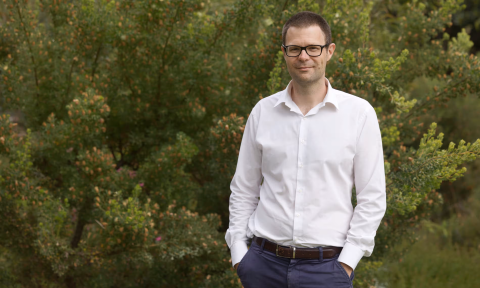
Andrew Whitehouse, who joins national school funding board, calls for urgent reform amid new government negotiations
A leading autism researcher who has been appointed to join the national board overseeing school funding arrangements says Australian children with disabilities are “struggling now more than ever” and urgent reforms are needed.
Prof Andrew Whitehouse, the head of the autism research team at the Telethon Kids Institute and the University of Western Australia, says tackling the growing rates of students with additional needs will be on the agenda this year.
“It’s beyond time to take a serious look at how we can support schools to support kids and their families to thrive,” Whitehouse told Guardian Australia.
“At the policy level, we have invested considerable amounts of funding and research into the very early years – we are delivering children safer, more advanced and more ready to learn. The challenge is we’re delivering them to an environment that may not be suited for them.”
His appointment by the federal education minister, Jason Clare, comes as state and federal governments negotiate a new National School Reform Agreement (NSRA), with the sector in the spotlight over growing teacher shortages and underfunding.
Prof John Firth, a former chief executive of the Victorian Curriculum and Assessment Authority and integral board member during the development of Naplan, was also appointed to advise on disability funding.
The number of students with a disability has been steadily rising over the past decade, with almost a quarter of students (24.2%) receiving an educational adjustment last year, according to Australian Curriculum, Assessment and Reporting Authority data.
It compares with 22.5% in 2022 and 18% in 2015.
Of the 991,272 school students who received an adjustment in 2023, more than half (54.3%) was for cognitive disability, followed by a social-emotional disability (33.6%).
Whitehouse said Australia has become far better at identifying children with additional needs, but there were also “more kids struggling now than ever”.
“Early development [among children with disabilities] is plateauing if not going backwards,” he said. “It should give us great pause for thought.”
Whitehouse joins the National School Resourcing Board weeks after a landmark review of the National Disability Insurance Scheme found schools and childcare systems would need to act as community centres providing support services in order to rein in ballooning costs.
“With the federal government signalling the importance of the school environment in supporting the NDIS ecosystem, it’s without question [that] the school policy setting and funding arrangements need to be addressed, along with the right training for teachers,” he said.
Children and Young People with Disability Australia has been lobbying the federal government for additional funding to prevent exclusion and enrolment refusal of students with additional needs, as well as addressing learning gaps.
Two in three Australians aged 20 and over have completed year 12 – but that drops to one in three among people with a disability.
Clare said “all Australians, including students with disability, should have access to a good education and be safe and supported at school”.
The NDIS review in November preceded a major review into the current school reform agreement handed down late last year, which also made the case for schools to strengthen links between community and health services in order to make sure children who do not receive funding from the NDIS get support.
The NSRA review warned there was an “urgent need” to embed inclusive education across the system, adding that different criteria to access funding and supports risked children “slipping through the cracks”.
It also noted the public system was doing the heavy lifting – particularly amid “shoulder tapping” – the practice of moving students on from the private sector once they reach their high school certificate – and pointed to a lack of transparency and accountability, warning that “too many data gaps exist … most notably for students with disability”.
Whitehouse said that with the public system supporting the bulk of children with additional needs, improvements were needed to support greater numbers.
At the same time, he said a large number of children pushed into special schools had the “real potential” to be educated in mainstream settings with adequate resourcing.
“The most important frontier we must conquer now is school,” Whitehouse said.
“It’s not just a human right enabler, it’s an enabler to all other human rights and we are simply not there at the moment.
“For several generations there has never been a more important moment than this – how we can design an education system that embraces children. We need to take the lessons from recent reviews and take action.”